The overall health benefits of nettle tea provide great motivation to drink some of this refreshing herbal tisane!
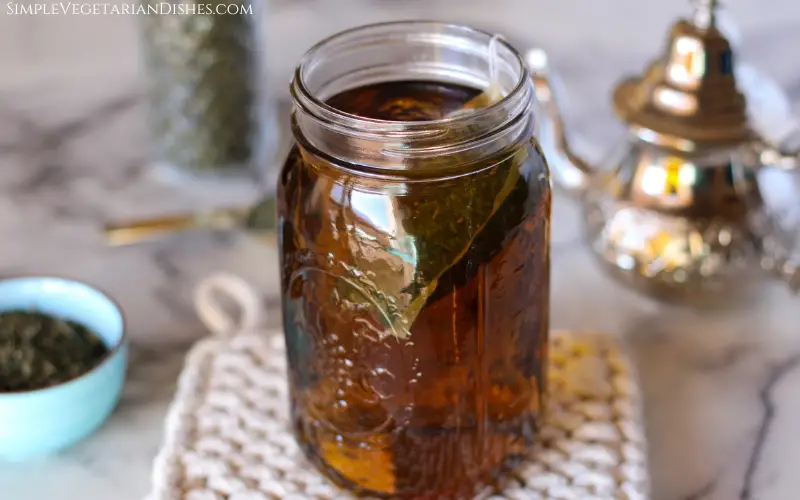
Read on for some great reasons to try adding a cup of nettle tea to your daily routine!
What is nettle tea?
People brew nettle tea using the dried, heart-shaped leaves of the stinging nettle plant (Urtica dioica).
Stinging nettle originally came from its native northern Europe, Asia, and western North Africa. Now, you can find it worldwide, including in North America.
Nettle has many tiny, hollow stinging hairs called trichomes on the leaves and stems. If you touch stinging nettle with your bare hands, these tiny hairs can act as hypodermic needles, by injecting histamine and other chemicals that produce a stinging sensation on the skin that can last for hours, or even cause blisters.
I chose to err on the side of caution and buy dried nettle, as once nettle is dried or blanched, it is perfectly safe to handle, eat, and make tea from.
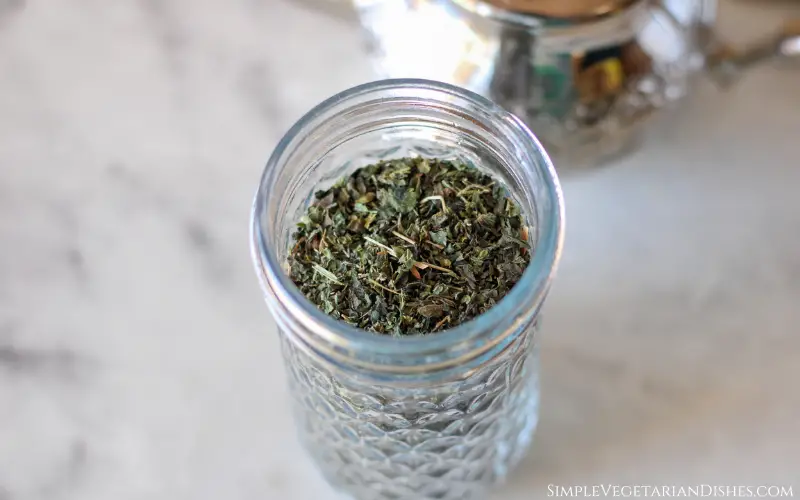
What is nettle tea good for?
Nettle has served as herbal medicine for over 2000 years. Modern science supports the use of nettle as a natural remedy for many health problems, including:
- pain, especially from arthritis,
- seasonal allergies,
- urinary tract concerns, and
- hair loss.
What does nettle tea taste like?
Stinging nettle tea tastes similar to green tea, but without the bitterness – very green, herbaceous, and vegetal.
If you don’t care for the taste but would enjoy the health benefits, you can always add some mint to it. Mint and nettle go well together, and mint can be very overpowering, which is great if that’s the flavor you prefer out of the two.
Iced nettle tea, with or without mint, is very refreshing, and if you find the flavor of hot nettle tea a bit strong, you may prefer it refrigerated.
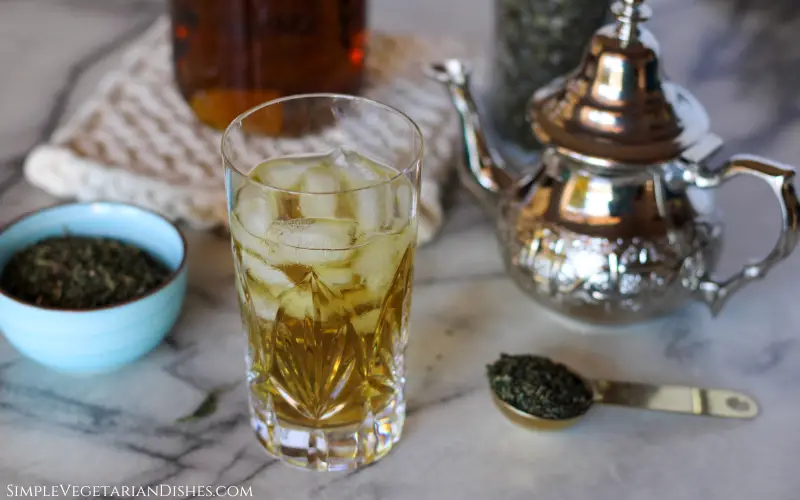
Medicinal Health benefits of nettle tea
Some nettle tea benefits include:
- lowering blood sugar levels
- lowering blood pressure
- treating arthritis pain
- supporting a healthy urinary tract
- supporting kidney health
- acting as a natural antihistamine
- supporting bone health
- reducing inflammation
- supporting your immune system
- treating and preventing hair loss
With all these nettle leaf tea benefits, you may want to brew some to drink while you finish reading!
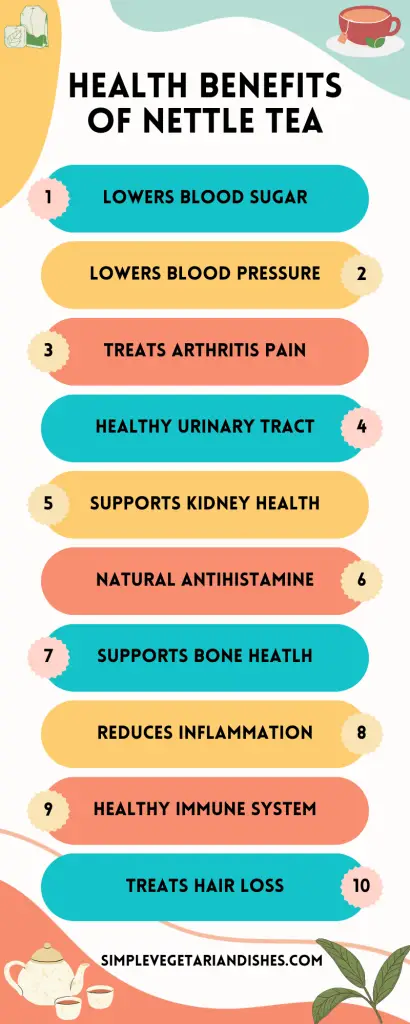
Nettle tea can help support healthy blood sugar management
Traditional medicine uses stinging nettle leaves as an anti-hyperglycemic agent to treat diabetes.
Another 2013 double-blind study confirmed this traditional wisdom and found that nettle leaf extract lowered fasting blood glucose levels and HbA1C significantly for patients who were taking insulin as well as oral diabetes medications.
The researchers concluded that nettle extract may safely improve glycemic control in type 2 diabetic patients needing insulin.
It can also lower blood pressure
Regularly consuming nettle tea can help lower systolic blood pressure and also relieve stress and tension in the cardiovascular system.
Since high blood pressure can put you at risk of heart disease and strokes, this is extremely beneficial. Reducing elevated blood pressure levels also significantly reduces the risk of cardiovascular events such as a heart attack.
One way stinging nettle achieves this effect is that it may stimulate nitric oxide production, which acts as a vasodilator. This means it relaxes the muscles of your blood vessels and helps them widen.
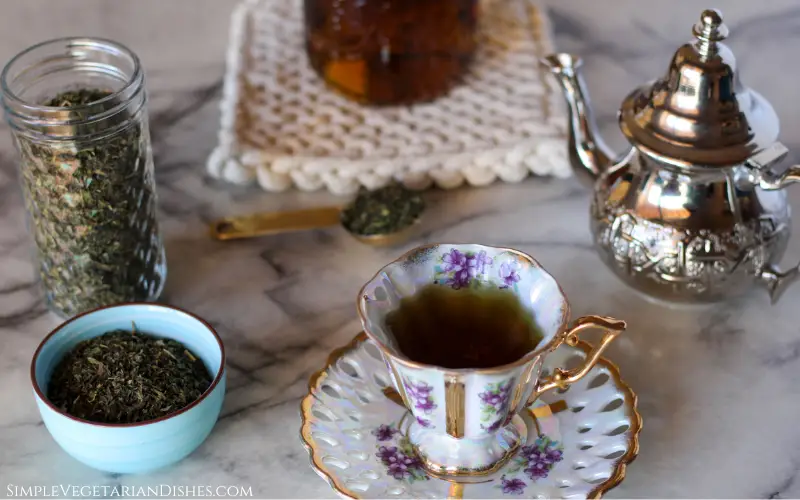
Nettle tea can help treat arthritis pain
People have historically used nettle to treat pain and sore muscles, especially related to rheumatoid arthritis.
The Arthritis Foundation lists nettle tea as a supplement to help manage arthritis symptoms, and specifically to help reduce inflammation and joint pain accompanying osteoarthritis and gout.
Some people achieve good results by combining the anti-inflammatory properties of stinging nettle with nonsteroidal anti-inflammatory drugs like aspirin.
In one rather remarkable study published by the Journal of the Royal Society of Medicine, people with osteoarthritic pain at the base of the thumb or index finger deliberately stung themselves by placing stinging nettle leaves on the painful area daily for one week. After a week of treatment, both pain and disability were significantly reduced compared to a placebo.
It can support a healthy urinary tract
Nettle can help flush harmful bacteria out of the urinary tract.
In a 2013 double-blind study, researchers gave 50 men with benign prostatic hyperplasia (BPH) a placebo, and another 50 nettle.
(BPH leads to an enlarged prostate gland in men, which can cause pain and other problems urinating.)
The men who took nettle had reduced clinical symptoms, leading the researchers to recommend that nettle be used more in treating BPH patients, especially given its safety in terms of side effects.
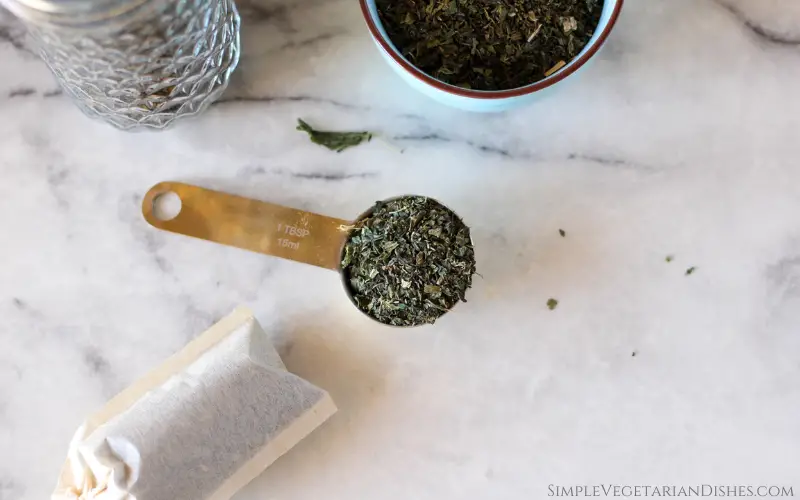
The health benefits of nettle tea include supporting healthy kidneys
Treatment with stinging nettle extract can help significantly reduce the size of kidney stones, and nettle tea’s diuretic properties can help flush out harmful toxins.
Nettle can provide relief from water retention because it increases urine output.
Note: While nettle tea can be beneficial, people with kidney disease may wish to avoid it or speak to their doctor about how much is safe. This is because stinging nettle contains potassium and phosphorus, both of which people with kidney disease (especially those on dialysis) may need to limit in their diets.
Nettle tea can help with seasonal allergies
Folk medicine has long used stinging nettle to reduce mild allergy symptoms caused by allergic rhinitis, also called hayfever.
Modern science and clinical trials appear to back that up, with nettle root extract helping to control symptoms of hay fever (including runny nose and other allergic reactions) in this study.
That being said, the National Centers for Complementary and Integrative Health state that the evidence is either inconsistent or too limited to show whether nettle truly has a positive effect.
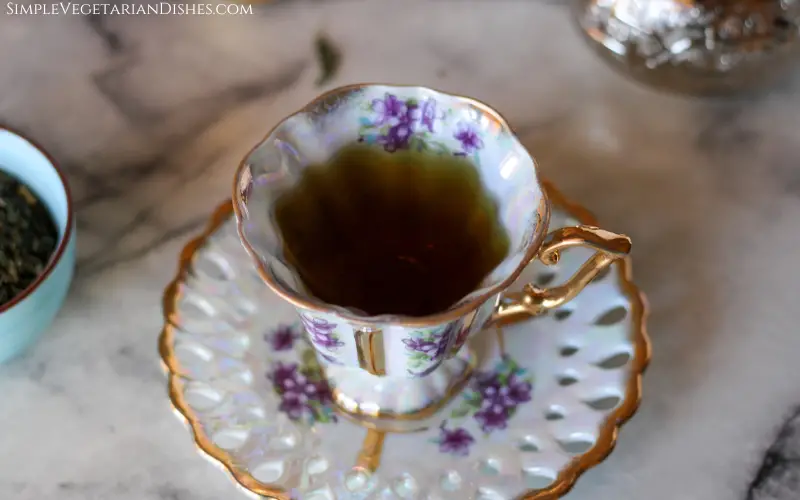
It supports bone health
Nettle supports bone health in numerous ways.
Stinging nettle provides high amounts of bone-building minerals including iron, calcium, magnesium, potassium, and zinc.
It also distinguishes itself as one of the best sources of vitamin K, which helps support bone health by promoting osteoblastic activity (bone production and strengthening activity).
Finally, stinging nettle provides an abundance of boron. Boron helps keep calcium levels in human bodies at a healthy level, which can help delay the onset of osteoporosis.
Nettle tea provides powerful polyphenols
Nettle contains a high quantity of plant chemicals known as polyphenols. These powerful compounds may help prevent and manage chronic diseases related to inflammation, including diabetes, cancer, and heart disease, also called cardiovascular disease.
Specifically, nettle and the biologically active compounds (polyphenols) it contains may be beneficial in treating breast cancer, as well as prostate cancer.
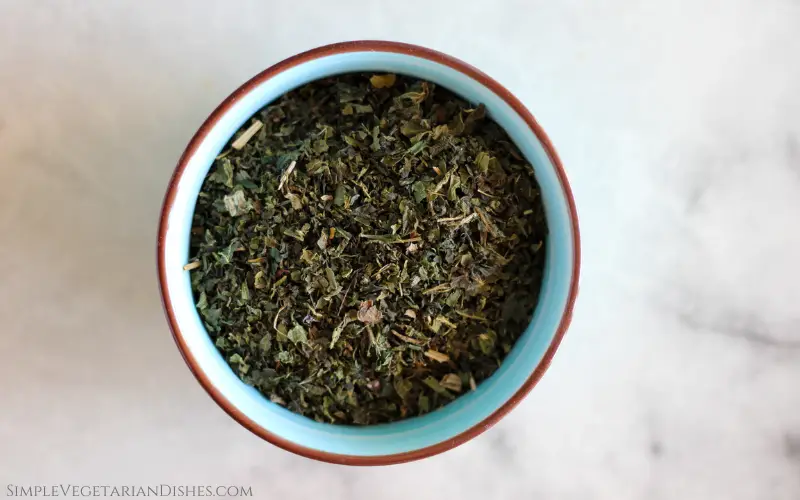
Stinging nettle tea can support your immune system
Stinging nettle leaves are a rich source of antioxidants, including vitamin C.
Vitamin C reduces harmful free radicals in your system. It also can help protect against environmental oxidative stress.
A study on rats showed that stinging nettle extract can stimulate the proliferation of immune cells, specifically T-cells, a type of white blood cell that helps your immune system fight off germs and protect you from disease. (Please note that this finding was not from human studies.)
Nettle can help you maintain healthy hair
Nettle serves as one of the oldest recorded herbal remedies used to treat and prevent hair loss.
For thousands of years, people have used stinging nettle to beautify their hair.
Nettle provides a cocktail of essential nutrients that directly contribute to glowing, healthy skin and hair. This includes vitamins A, B, C, D, and E, as well as minerals including folate, riboflavin, magnesium, potassium, calcium, iron, and manganese.
Stinging nettle contains silica, which can help make hair and nails stronger. It can also promote hair growth by boosting blood flow.
Nettle can help strengthen and relax the blood vessels. This enhances blood circulation and increases the amount of oxygen and nutrients that the scalp receives. In turn, this helps hair grow stronger as well as longer.
In addition, nettle contains abundant antioxidants, flavanoids, and vitamin C. These can help reduce inflammation and can help protect against and neutralize free radicals. Free radicals can expedite signs of aging, including thinning hair. Inflammation of the scalp is hugely responsible for chronic hair loss as it damages hair follicles, which leads to hair fall and thinning.
This makes the use of nettle products, including tea, extremely beneficial for hair and skin health.
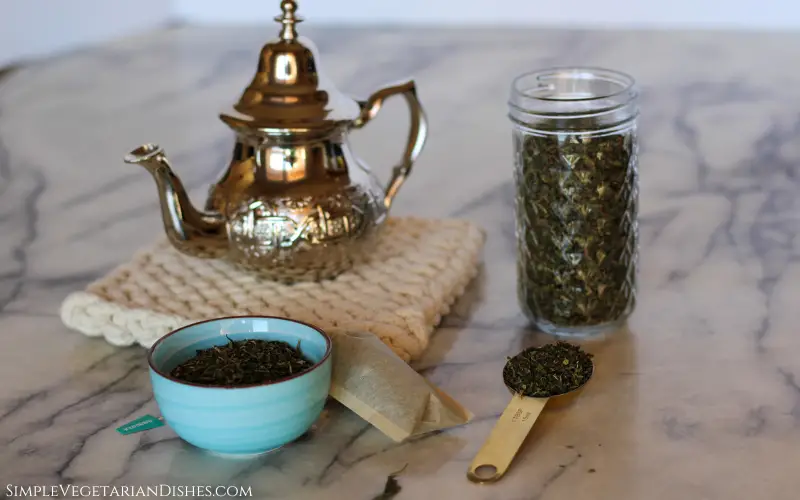
Health benefits of nettle tea for women
Stinging nettle serves as a natural diuretic and helps clear more toxins linked to urinary tract infections, which women are more likely to get than men.
Women have traditionally used stinging nettle to support milk supply.
In addition, the astringent qualities of nettle may help reduce cramps and bloating during the menstrual cycle.
A note on the health benefits of nettle tea for pregnant women
While some people swear by nettle tea during pregnancy, others have expressed concern that it might trigger uterine contractions.
Pregnant people may wish to ask their doctor or err on the side of caution and hold off entirely.
Nutritional health benefits of nettle
Stinging nettle is an edible plant with nutritional and medicinal properties. The leaves provide abundant fiber, minerals, vitamins, and antioxidant compounds including polyphenols and carotenoids.
People commonly cook and consume nettle just like any other leafy vegetable in areas where vegetables are scarce, including Nepal. It contains calcium, iron, protein, phosphorus, and vitamins A and C. You can use it in soups and in juices as well as for herbal teas. It evidently tastes similar to spinach.
People regard stinging nettle as “one of the healthiest foods on the planet.”
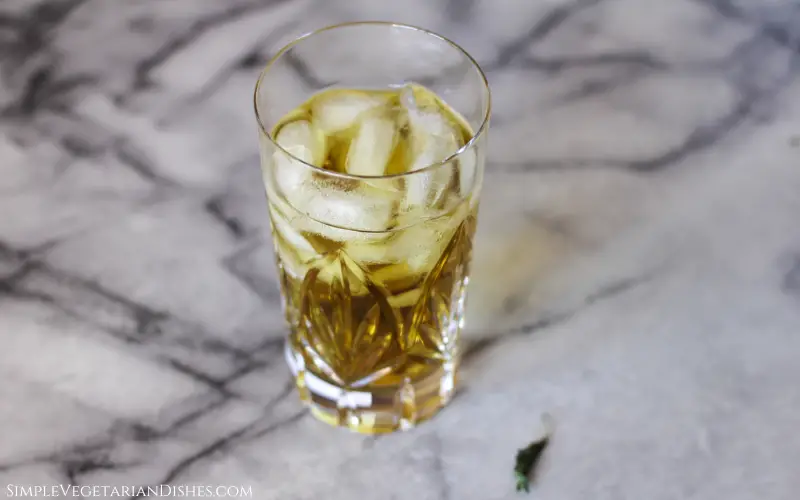
Safely handling nettle leaves
Once dried, freeze-dried, or cooked, nettle leaves are perfectly safe to handle. If you simply buy dried nettle with the intent of making tea, you won’t have any issues with the stinging part of stinging nettles.
However, if you are foraging your own wild stinging nettle, you will need to exercise caution.
Oregon State University’s Extension Service recommends wearing long sleeves, long pants, and long kitchen rubber gloves when gathering nettles. They also recommend using sharp scissors to clip the stems and leaves.
When harvesting, collect only the tender, young leaves and shoots at the top of the plant, and leave the more mature leaves on the bottom half of the plant.
Once you have collected what you will use, carry your harvest in a breathable container such as a paper bag or basket.
Blanch the nettle to clean and soften it, and to destroy the stinging fine hairs, called trichomes, so you can safely eat it.
Once blanched, you can eat the stinging nettle by substituting it in any recipe calling for cooked spinach or kale.
If you prefer, you can also freeze it or dry it for later use, such as for making nettle tea!
Pin these health benefits of nettle tea for later!
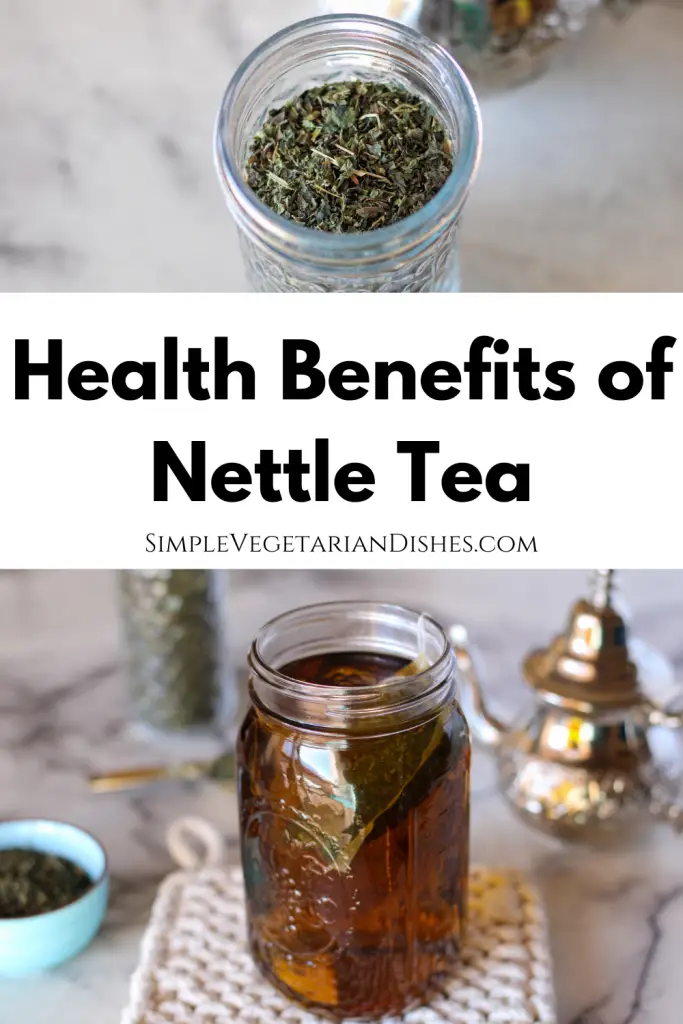
Ingredients for making nettle tea at home
- 4 Tbsp dried nettle leaves (you can also buy pre-packaged tea bags)
- 4 cups of water
- Tea ball, bag, or strainer to contain the leaves
- Large teapot or quart jar with lid
How to make nettle tea using dried leaves
- First, bring your water to a boil.
- Then, let it sit for just a moment until it stops boiling.
- Once there is no movement in the hot water, pour it over the nettle leaves in a large quart jar or teapot.
- Cover the tea to retain the volatile oils, and allow the tea to steep for 15 minutes for full potency. Enjoy hot or chilled (try it iced in warm weather)!
How to Make Fresh Nettle Tea
To make nettle tea using fresh leaves, use one cup of leaves for every two cups of water. Beyond that, you can follow the recipe as written.
Recipe card for making nettle tea at home
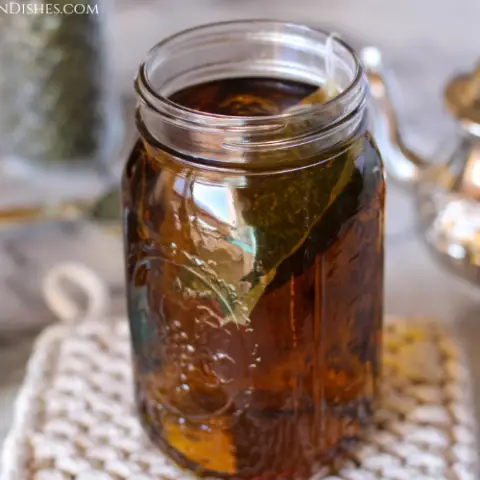
Nettle Tea (Using Dried Leaves)
The overall health benefits of nettle tea provide great motivation to drink some of this refreshing herbal tisane!
Ingredients
- 4 Tbsp dried nettle leaves (you can also buy pre-packaged tea bags)
- 4 cups of water
- Tea ball, bag, or strainer to contain the leaves
- Large teapot or quart jar with lid
Instructions
- First, bring your water to a boil.
- Then, let it sit for just a moment until it stops boiling.
- Once there is no movement in the hot water, pour it over the nettle leaves in a large quart jar or teapot.
- Cover the tea to retain the volatile oils, and allow the tea to steep for 15 minutes for full potency. Enjoy hot or chilled (try it iced in warm weather)!
Nutrition Information:
Yield: 4 Serving Size: 1Amount Per Serving: Calories: 2Total Fat: 0gSaturated Fat: 0gTrans Fat: 0gUnsaturated Fat: 0gCholesterol: 0mgSodium: 10mgCarbohydrates: 0gFiber: 0gSugar: 0gProtein: 0g
Spiritual benefits of nettle tea
The spear-shaped leaves or arrow-shaped leaves provide a clue as to the function of stinging nettle.
Anecdotally, people report that working with nettle tea can help light a fire under their butt to do something they’ve been meaning to do for a long time, but never prioritized.
One woman reported that nettle helped her start a near-daily exercise routine and lose 15 pounds.
Intrigued, I decided to try it out for myself. I had been thinking that setting up an Etsy shop as a companion to this blog would probably be a good idea, but had never gotten around to actually doing it. For 30 days, I brewed and drank one quart of nettle tea every day. And wouldn’t you know, by the end of the month I had launched my Etsy shop with my first nine digital products.
Of course, I have no way of knowing whether or not I had just tricked myself with the placebo effect. Either way, though, it was kind of fun, and I will be doing it again next time I take on a big project. Who wouldn’t want a little boost?
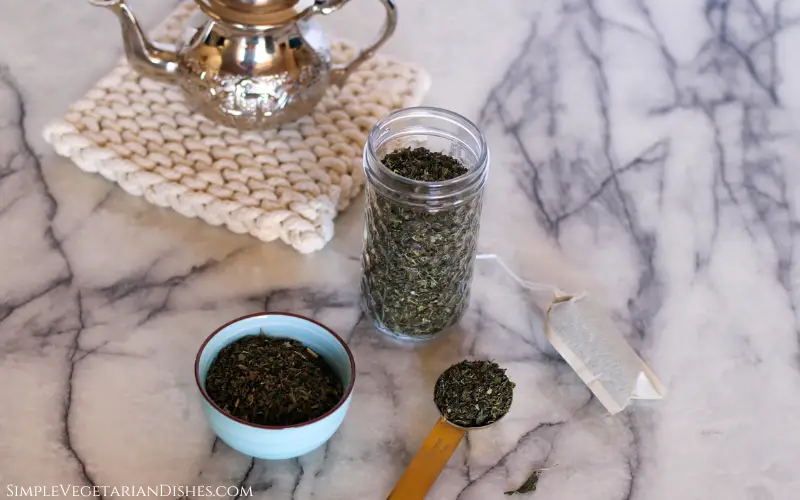
Magical benefits of nettle tea
In Hellenistic astrology/Renaissance astrology, stinging nettle is associated with the planetary archetype of Mars. As such, people may use nettle tea when working with Mars for help with a competitive task, or a task requiring the courage of a warrior.
This is an example of planetary magic, or aligning yourself with the energies traditionally associated with a specific planetary diety to improve a particular area of your life.
For example, Mars is associated with winning, competitiveness, skill in battle, sports, and other athletic challenges, as well as winning over a lover.
If you have never done cross fit, but want to complete a 30-day cross fit challenge, you might choose to work with Mars and drink nettle tea every morning before your workout.
(On the other hand, if you want to establish a habit of walking for an hour every day for the rest of your life, you may prefer to work with Saturn for more sustainable routines of discipline.)
With all these health benefits of nettle leaf tea in mind, consider adding some to your kitchen!
If you enjoyed reading about the health benefits of nettle tea, check out these related articles
You may also enjoy:
Health benefits of Turkish coffee
Quotes on Self-Control and Discipline
If you found this article helpful, please consider joining my email newsletter community for new recipes delivered straight to your inbox!
Important: This post is for informational and educational purposes only. This post should not be taken as medical or nutritional advice or used as a substitute for such. You should always speak to your own doctor or nutritionist before implementing this information on your own. Thank you!

Leave a Reply